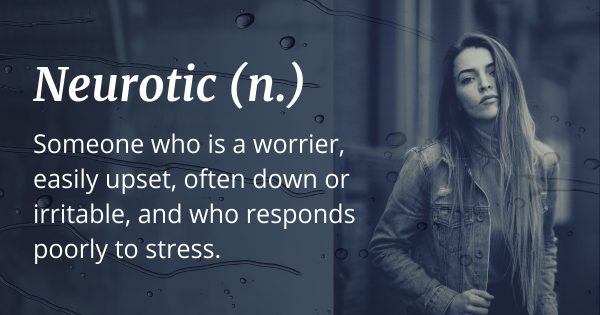Whenever you hear about neurotics, you immediately think they’re certainly struggling with some kind of mental problems. You should know that neuroticism is not a personality disorder but one of the Big Five factors in the study of personality in psychology. It’s true though that people who are neurotic are more likely to develop mental illnesses.
MORE: What You Should Know If You Love Someone With High-Functioning Depression

MORE: A Restless Mind: The Burden Of Being Outgoing And Anxious At The Same Time
The Big Five is a model based on the hypothesis that all personalities share some basic features: extroversion, agreeableness, conscientiousness, openness to experience, and neuroticism. As a result of a different kind of blend between these psychological dimensions, we have unique personalities. Thus, a neurotic person is someone who scores high on the neuroticism spectrum.
But how can you describe a person who’s neurotic? It can be summed up in one word, moodiness. Being moody and experiencing feelings of anxiety and sometimes depression, responding poorly to stress, that’s neuroticism in a nutshell.
Take a look at five traits typical to neurotic people:
1. They’re really volatile
They’re champions at mood swings. Such mood swings can impinge on their personal and professional life. Neurotic people are not emotionally stable, their mood changes abruptly, it can go from happy to gloomy in a matter of seconds. When facing stressful situations, people who score higher on the neurotic scale react with anxiety, irritability or other kinds of negative emotional response. A neurotic personality entails levels of anxiety and volatility, according to most studies.
2. They’re easily stressed
Neurotic folks are emotionally unstable so, most of the time, they overreact even on the little things. They are easily stressed and don’t seem to find their calmness when put in difficult situations.
3. They worry a lot
Worrying is simply in their nature, they are pretty much likely to freak out over tiny issues. They worry every so often.
4. They may struggle with anxiety or depression
Research has shown that neurotic people are more likely to struggle with psychological disorders like anxiety or depression. It doesn’t mean that all neurotics have this kind of problems, but their chances to develop issues like these are higher.
5. They are sensitive
Experiencing all those mood swings as well as reacting badly to stressful events implies that neurotic personalities are sensitive. Definitely more sensitive than people who are emotionally stable.
Let’s make it easier for people to understand neurotics, please share!










